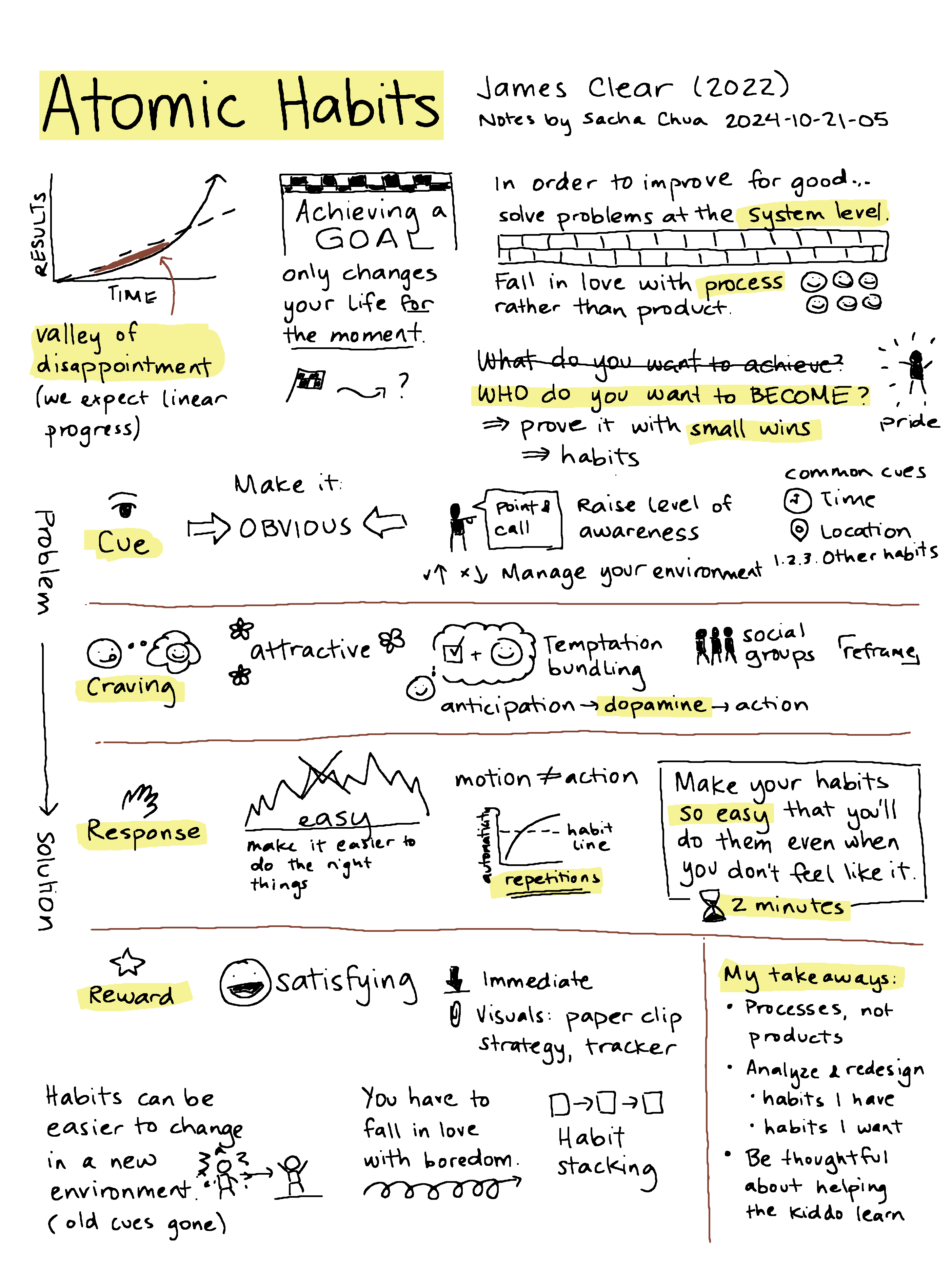Visual book notes: Atomic Habits
| visual-book-notes, productivity
Text from sketch
Atomic Habits - James Clear (2022) - Notes by Sacha Chua 2024-10-21-05
- time vs results: valley of disappointment: (we expect linear progress)
- Achieving a Goal only changes your life for the moment.
- In order to improve for good, solve problems at the system level.
- Fall in love with process rather than product.
- Not "what do you want to achieve?", who do you want to become?
- prove it with small wins
- habits
- prove it with small wins
- Problem phase
- Cue: Make it obvious.
- point & call: raise level of awareness
- common cues: time, location, other habits
- Manage your environment
- Craving: Make it attractive.
- Temptation bundling
- anticipation, dopamine, action
- Social groups
- Reframe
- Temptation bundling
- Cue: Make it obvious.
- Solution phase
- Response: Make it easy.
- Make it easier to do the right things
- Motion != action
- Repetitions, automaticity: habit line
- Make your habits so easy that you'll do them even when you don't feel like it
- 2 minutes
- Reward: Make it satisfying.
- Immediate
- Visuals: paper clip strategy, tracker
- Response: Make it easy.
- Habits can be easier to change in a new environment. (old cues gone)
- You have to fall in love with boredom
- Habit stacking
- My take aways:
- Processes, not products
- Analyze & redesign:
- habits I have
- habits I want
- be thoughtful about helping the kiddo learn
In my life
Habits I'm tinkering with:
- Tidying and listening: When the kiddo watches videos in the afternoon, I'll get dinner started (unless W- has taken care of it already), and then I'll listen to a podcast while tidying.
- Reading: It turns out I can export my highlights from Libby, even from a returned book. That means I can do a little reading at night or when I have a spare moment on my phone, then look at the highlights when doing a sketchnote. This makes it easier and allows me to feel like I can squeeze it in whenever..
- Shuffling my to-do list: I'm experimenting with shuffling my unscheduled tasks to add some variable rewards to my someday/maybe list, increasing its attractiveness.
I like the focus on process rather than product. I was briefly enamoured with Big Hairy Audacious Goals but it turned out that wasn't really that motivating for me. These days, I'm more curious about enjoying life, making sense of things, and making incremental improvements to my processes.
I don't quite agree with the thought that you have to fall in love with boredom. I think part of continuous improvement is being able to find more things to be curious about, even with the basics, and to enjoy your progress and consistency. Maybe "fall in love with boredom" isn't quite the right wording for me. I think the author meant that you've got to be able to keep doing the routine stuff, which makes sense, but I hope I can still occasionally find interesting things in it. My brain probably just doesn't like the idea of boredom very much and has a bit of a visceral reaction to the word.
I am also iffy about streaks (they're not that motivating for me), commitment contracts and punishment (definitely not the way my brain likes to work), and never missing twice. My approach of being curious and gentle with myself might be suboptimal, but that's okay with me.
Parenting
When it comes to parenting and helping the kiddo learn habits, the approach I'm gradually coming to feels a little different from the bonus chapter he posted on his website.
I like explicitly talking about figuring out how to work with our particular brains and bodies, including habit mechanisms and dopamine. The kiddo is eight and quite capable of co-experimenting. She likes to alternate homework with snuggles, Minecraft, or Youtube videos. Sometimes I feel a little twitchy about alternating, like, two minutes of homework with twenty minutes of videos, but she's managed to get all her work done so far.
That also means I talk about how I'm figuring out my brain. When I forget something, I talk about how I'm going to change the cues for it so that I remember.
I want to develop intrinsic motivation and pride more than using praise, since I don't want her to rely too much on other people's evaluation of her. I try to focus my verbal feedback on enthusiastically observing what she's doing and how she's feeling. ("You worked on your homework and got that part done, and it's not even 9 AM! Does that feel so satisfying?") Now she occasionally talks about wanting to do certain things (ex: walk home instead of riding in my cargo bike) because of the satisfaction she'll feel, so I think it's working.
Identity and pride are helpful for habit formation, but it can be easy to develop a fixed mindset ("I'm smart") instead of a growth mindset. It's also easy to focus on results that might not always be within her control. I want to focus her attention more on what she does and how she does it. It's like not focusing on "being a good student" or "getting good grades", but on figuring out how to work with her brain. Assigments and grades are part of the feedback mechanism, but they're not the most important thing.
Links:
- Atomic Habits
- Lots of people have sketchnoted Atomic Habits. It's interesting to see what's different and what's common.

